|
High Street
Eastry
https://whatpub.com/bull-inn
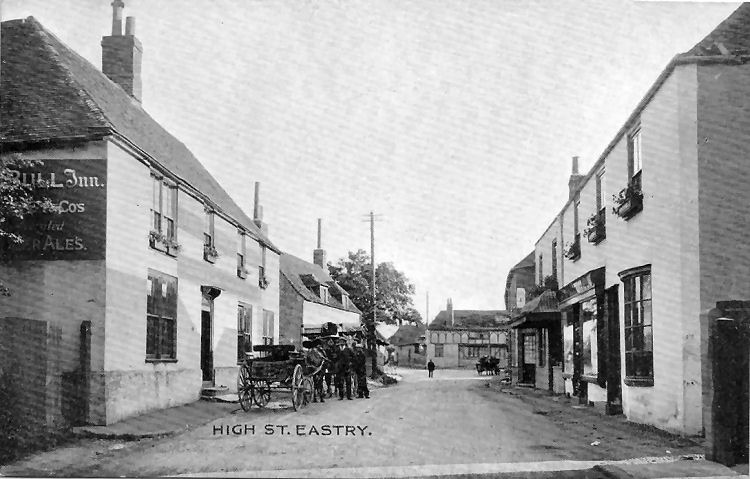
Above postcard, circa 1896, kindly sent by Rory Kehoe. |
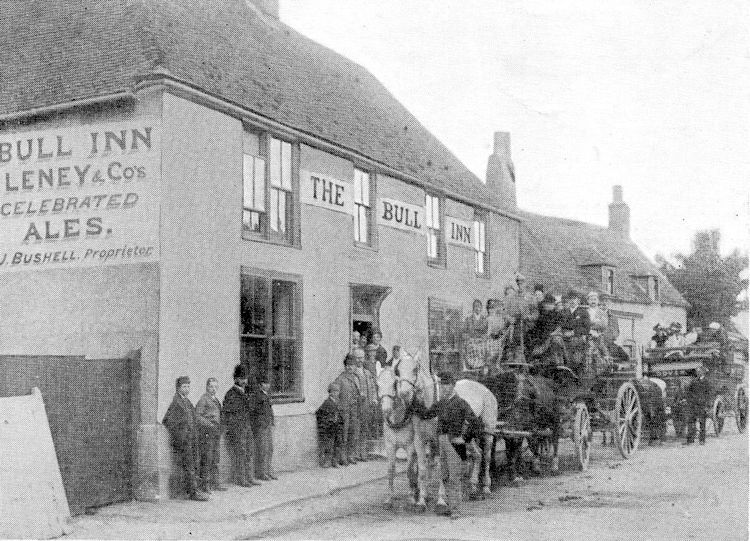
Above photo, circa 1900. |
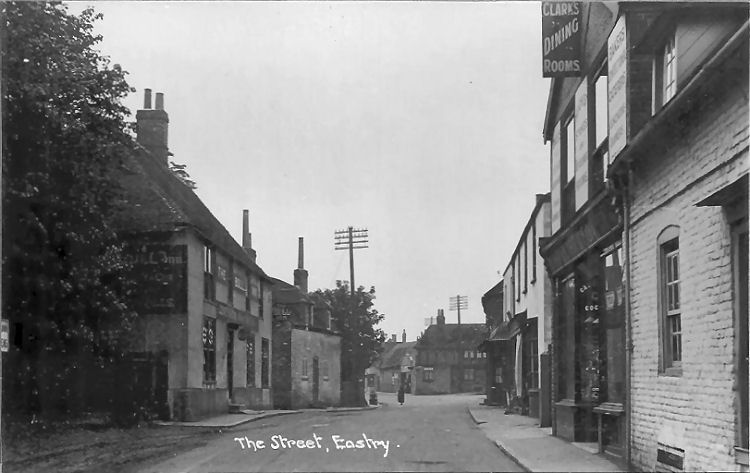
Above photo, 1900, kindly sent by Rory Kehoe. |
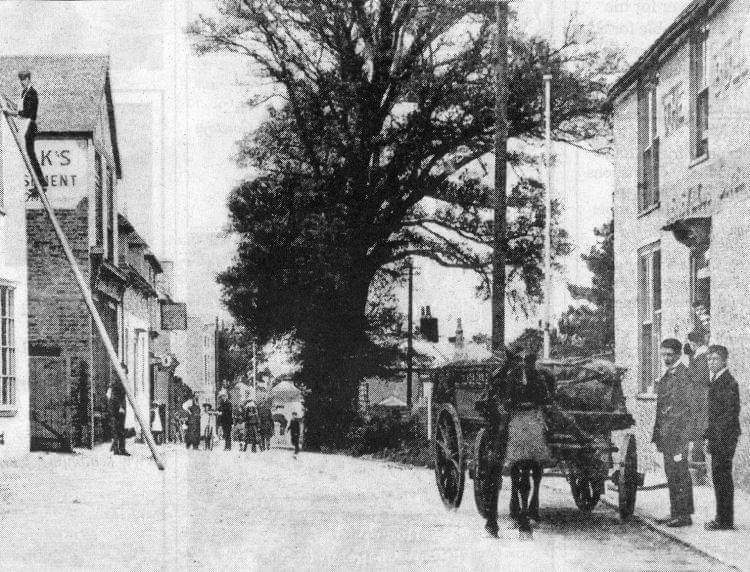
Above photo, date unknown. |
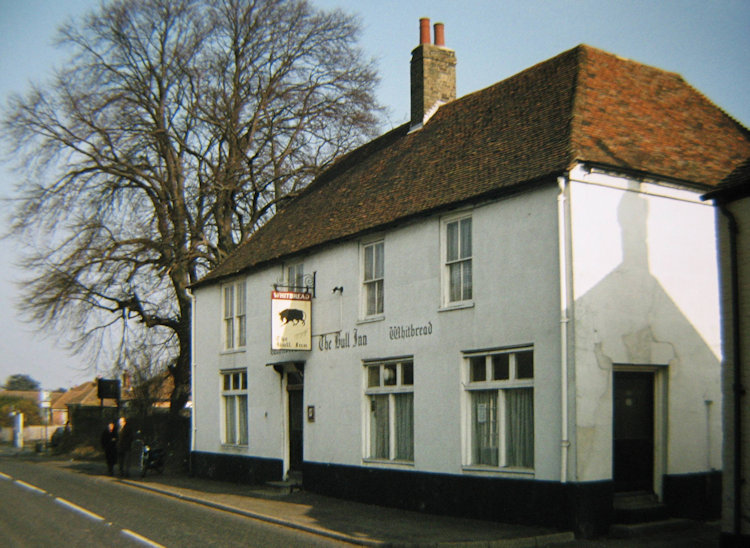
Above photo, 17 February 1984, by Jim Ashby. |
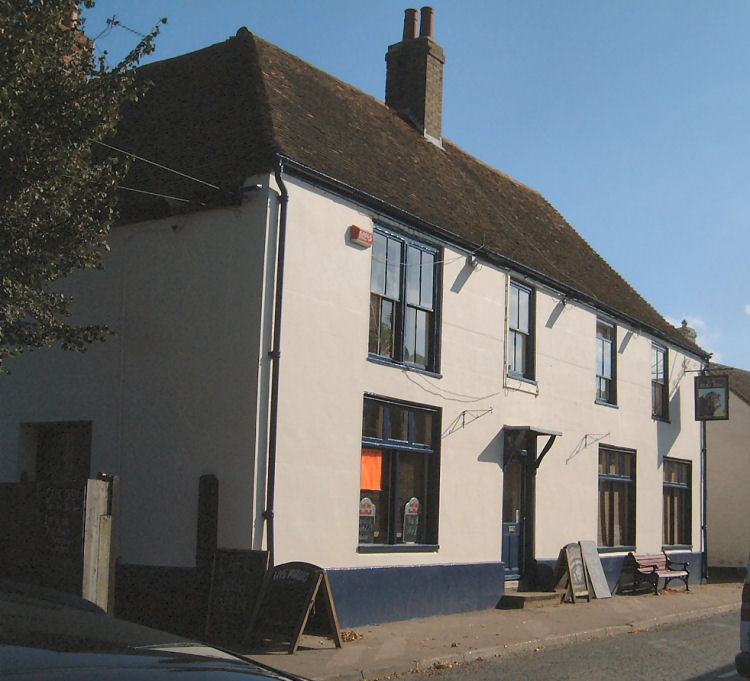
Above photographs by Paul Skelton 6 Oct 2007. |
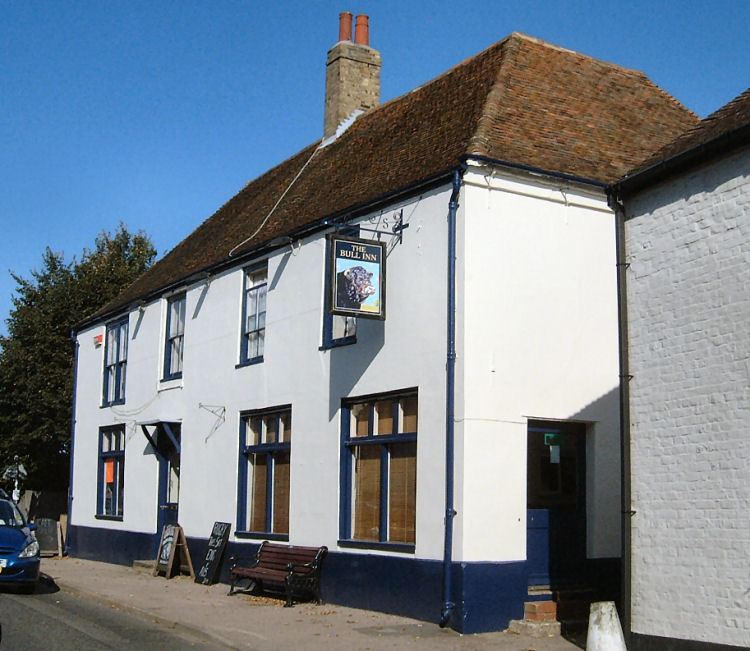
Above photographs by Paul Skelton 6 Oct 2007. |
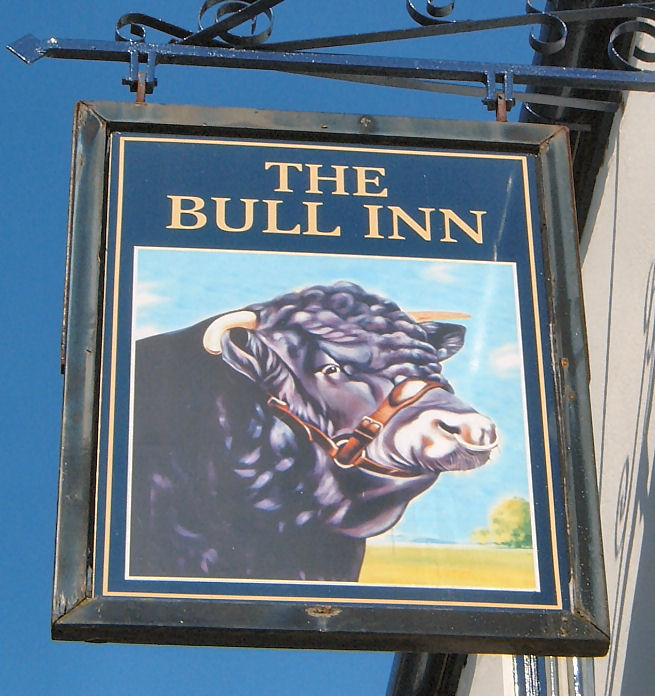
Above photographs by Paul Skelton 6 Oct 2007. |
16th Century pub.
Reference found in the Wingham Division Ale Licence list,
which shows the "Bull," Eastry, to be re-licensed for the sum of 8 shillings in
1740 indicating that the pub was present before 1740.
Supplied by Alfred Leney Co Ltd, who bought out Thomas Walker's Phoenix
Brewery in 1859 and registered as such in 1896, until bought out by Fremlin
Brothers brewery of Maidstone in 1926, brewing at the Dover brewery ceased
in 1927, which later passed to Whitbread.
|
From Liber Estriae; or, Memorials of the Royal Ville and Parish of Eastry, By William Francis Shaw. 1870
Next to the old
Schoolhouse is the "Bull Inn." This has probably been the name and site
of the village inn for some centuries. As early as A.D. 1573 it is
mentioned; and, in 1633, it is spoken of as "adjoining Goddard's House
for the Clerk, in Eastry Street:" whilst the church-wardens' accounts
often make mention of money "spent at the Bull."
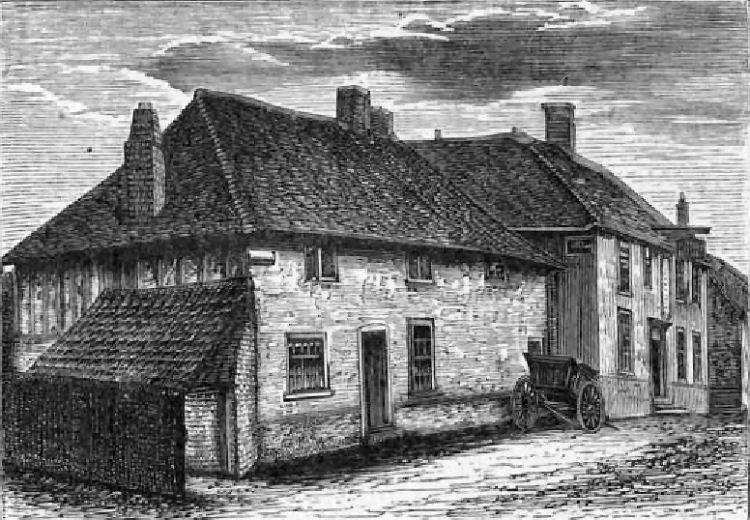
Above picture showing the Clerk's House next to the Bull, 1633 and pre 1870.
At the time it was said that the Clerk's house was very dilapidated
and uncared for. I assume it was removed shortly after 1870. (Paul
Skelton)
In A.D. 1573 Richard Huffam paid quit rent to the manor of Eastry for
the Bull. John Whitfeild, and after him Edmonde Baker, had been the
previous owners. And again, in A.D. 1633, Thomas Huffam paid for the
Bull. It is now the property of Messrs. Liney and Evenden brewers.
Almery Manerm in Eastry:- A Rentell made on the 20th day of August
1633 of all the Quittrents of money due to the said Mannor yeerly:- Richard
Stacy:- Thomas Hussam for the Bull Eastry 1s. 2d.
Goddard's Charity.
1574. This year the will (for which fee post) of " Chrystian Goddarde,
late of Eastrye, widow," was proved in the Consistory Court of
Canterbury, before Thomas Dickes, registrar. By this will she left to
the churchwardens of Eastry, and their successors churchwardens of
Eastry for the time being, one tenement and a garden, with the
appurtenances
in Eastry, over against the vicarage, to hold for the use of Joan
Frauncs,
her servant, during her natural life, and after her death to the use of
the
poor people of Eastry for ever.
This tenement opposite the vicarage is now in five dwellings, which
stand endways to the street, and are occupied respectively by widows
Bullock, Burton, Grayham, Wm. Fagg, and Spain. The appointment
to these cottages rests entirely with the churchwardens, who usually
charge the occupants a small yearly rent — 1ft, as an acknowledgment of
their
tenancy; and 2nd, to help somewhat towards the necessary repairs of the
buildings. Mrs. Goddard also left another tenement with a garden in
Eastry Street, for the use of "the Clarke of Eastrye " on certain
conditions,
which have been already more particularly mentioned under " The Parish
Clerks" This house adjoins the Bull Inn and is now in the occupation
of Thomas Young. Like the last, this appointment rests with the church-wardens, but they are tied down to appoint a certain person — viz., the
Parish clerk, the right of appointing whom rests with the vicar.
|
|
From Kentish Gazette 17-20 March 1789.
“ILLUMINATIONS”
“The general spirit of joy at His Majesty's happy recovery has
pervaded even the villages of this neighbourhood among which Eastry has
taken the lead in a manner that does credit to the loyalty as well as to
the liberality of its inhabitants. Wednesday noon the gentlemen and
principal inhabitants met, and while the music played God Save The King,
fired a royal salute of 21 cannon. In the evening there was a general
and splendid Illumination, with a second discharge of cannon. A handsome
supper was provided at “The Bull” when many loyal toasts were drank, and
the evening concluded with much festivity, and every possible
demonstration of joy. A liberal subscription was made for the poor, that
they too, might partake of that happiness which is so universally
diffused over the whole of the kingdom.” |
It appears to have been tied to a brewery owned by the prominent Sandwich
family, the Wyborns to 1822. In 1764 William Wyborn, brewer, died and his
business was left to his daughter Mary, who had married John Bradley. Their son,
William Wyborn Bradley was born in 1752 William being described as "common
brewer of Sandwich." William was elected Mayor Sandwich in 1785 and died in
1788. The Sandwich brewery and its tied estate of 27 pubs was eventually put up
for "sale by private contract" by William's son (also called William Wyborn
Bradley, born 1779) as advertised in the Kentish Gazette on 10th May 1822.
This pub was again sold along with another 11 public houses in neighbouring
villages in 1826. The sum was £1,190 for this house but it is not known from who or to
whom. Further information suggests it could have been Thomas Walker's
Phoenix brewery.
|
From the Kent Herald, 19 January 1826.
Kent. Freehold and Leasehold Public Houses and other Estates.
At Word, Fingersham, Northbourne, Sutton (next Dover,) Eastry, Tilmanstone,
Eythorne, Frogham, Womenswould, Addison, Barham, Woodnesborough, Goodnestone
(next Wingham,) Ash (next Sandwich,) Shoulden, Walmer, Ramsgate, Margate, Sarr.
St. Peter's, (Thanet) and Sandwich.
For sale by auction, by Pott and Denne.
At the "Bell Inn," in Sandwich, on Monday, the 13th day of February, 1826, at 11
o'clock in the forenoon precisely, (subject to such conditions and restrictions
as will be then and there produced,) the following Freehold and Leasehold Public
Houses and Estate's, in 27 lots, viz:-
Lot 1:- The "Crispin," public house, at Word.
Lot 2:- The "Jolly Gardener," ditto, at Finglesham, in the parish of Northbourne.
Lot 3:- The "Hound and Hare," ditto, at Northbourne.
Lot 4:- The "Star and Boot," ditto, at Sutton (next Dover.)
Lot 5:- The "Bull," ditto, at Eastry, with cottage adjoining.
Lot 6:- The "Three Colts," ditto, at Tilmanstone.
Lot 7:- The "White Horse," ditto, at Eythorne.
Lot 8:- The "Red Lion," ditto, at Frogham.
Lot 9:- The "Rose and Crown," ditto, at Woolwich Green, in the parish of Womanswould.
Lot 10:- The "Bull Head," ditto, at Adisham.
Lot 11:- The "Duke of Cumberland," ditto, at Barham.
Lot 12:- The "Charity," ditto, at Woodnesborough.
Lot 13:- The "Three Crowns," ditto, Goodnestone (next Wingham.)
Lot 14:- The "Admiral Harvey," ditto, at Ramsgate.
Lot 15:- The "Ship," ditto, at Ramsgate, with two small cottages at the back.
Lot 16:- The "Red Lion," ditto, at St. Peter's, (Thanet) with cottage adjoining.
Lot 17:- The "Crown and Thistle," ditto, at St. Peters, Thanet.
Lot 18:- The "Crown," ditto, at Sarr.
Lot 19:- The "King's Head," ditto, in Walmer Road.
Lot 20:- The "Duke of York," ditto, in Walmer Road.
Lot 21:- The "Chequers," ditto, in the Sandhill's, in the parish of Shoulden.
Lot 22:- The "Ship Inn," at Ash next Sandwich with extensive stabling, yard,
Gardens, &c.
Lot 23:- A Dwelling House, near or adjoining the last lot, in the occupation of
Mrs. Maria Green.
Lot 24:- Three Cottages, adjoining the last lot, with the gardens used theirwith,
now in the several occupations of Vincent Noble Kennard, John Harrison, and
Steven Solly.
Lot 25:- All that building and Hop Oast, next or adjoining the last lot now in
the occupation of Mr. Thomas Minter Tomlin
Lot 26:- A Freehold Dwelling House, and Premises, in Church Square, Margate, in
the occupation of William Dale.
Lot 27:- The "New Inn," in Sandwich, with Assembly Room, Theatre, Stables,
Yards, &c.
N.B. Lots 19, 20, and 21, are leasehold, and all the others freehold.
The premises may be viewed on application to the respective tenants, and printed
particulars had (seven days prior to the day of sale) of the auctioneers, and at
the "Bell Inn," Sandwich; "Kings Head Hotel," Canterbury;
"Antwerp Inn" Dover;
"Black Horse Inn," Deal; "Spread Eagle Inn," Ramsgate; "York Hotel," Margate; of
Mr. Benjamin Hall, Solicitor, No. 2, Serjeant's Inn, Fleet Street, London; and
at the offices of Mr. Noakes, Solicitors, Sandwich.
|
|
Sussex Advertiser 20 February 1826.
At the sale of the public houses and other estates, situate in the eastern
parts of the County of Kent, which took place at the "Bell Inn," Sandwich,
on Monday last, Messrs. Pott and Denne knocked down the following lots, at
the sums affixed to them, viz.:—
The "Bull," at Eastry, £1,190.
"Three Colts," Tilmanstone, £500.
"White Horse," Eythorne, £575.
"Red Lion," Frogham, £455.
"Rose and Crown," Womenswould, £166.
"Duke of Cumberland," Barham, £910.
"Charity," Woodnesborough, £710.
"Three Crowns," Goodnestone, £620.
"Admiral Harvey," Ramsgate, £1,150.
"Ship," Ramsgate, £1,250.
"Red Lion," St. Peters, £1,100.
"Crown and Thistle," St. Peters, £705.
"Crown, or Halfway-house," Sarr, £940.
"King's Head," Walmer Road, £425.
The "Duke of York," Walmer Road, £310.
The sale-room was most numerously attended.
We understand that the "Ship," at Ash, and "Crispin," at Worth, have since
been sold by private contract, the former for £750, and the latter for five
hundred guineas.
|
|
From the Kentish Gazette, 9 May 1843.
The members of the Eastry £10 Burial Club held their fourth annual meeting
yesterday se’nnight at the "Bell Inn,"
(sic) to appoint
officers for the year ensuing, and to examine the accounts of the past year.
The secretary, Mr. Richard Moat, read the report and
statement, and we rejoice to say that the club is in a flourishing state.
There had been nine deaths during the year, and twenty-six
since the establishment of the club. The amount received from members,
subscribers, and in donations, was £298 6s. 4d.,and the
expenditure £279 14s., leaving in the hands of the treasurer 12s. 4d., with
twenty-nine candidates for admission on the books.
|
|
Dover Chronicles 20 February 1847.
Death.
Feb. 14, at Eastry, Mr. Ferrier, many years landlord of the "Black
Bull."
|
|
Kentish Gazette, 23 February 1847.
DEATH.
Furrier:- Feb. 15, at Eastry, Mr. Furrier, many years landlord of the "Black
Bull."
|
|
Kentish Gazette 24 September 1850.
MARRIAGE. FERRIER-FAGG.
Sept. 17, at Eastry Church, Mr. William Ferrier, second son of the late Mr.
Ferrier, "Bull Inn," Eastry, to Harriett, daughter of Mr. Richard Fagg,
tailor, etc., both of Eastry.
|
|
Southeastern Gazette, 26 July 1853.
Felonious Assault at Woodnesborough.
Edward Fagg, 18, William Fagg, 21, Edward Swains, 25, Richard Cart,
33, and John Bean, 22, were indicted, the latter for committing a
felonious offence upon the person of Mary Ann Bicker, against her
will, at Woodnesborough, and the four others with aiding and
abetting in the said offence. Mr. Horn prosecuted.
From the evidence adduced it appeared that the prosecutrix, a single
woman, was at the "Bull Inn," at Eastry, on the 27th June, and left
that inn between ten and eleven o'clock at night, in company with
two young men named Spinner and Jarvis, and a young woman named Jane
Whitmarsh. Prosecutrix walked with Spinner, and Whitmarsh with
Jarvis. When they came out of the inn they saw the prisoners
standing outside, who followed them. They then went into the "Bells" public-house, as they alleged, for the purpose of getting rid of the
prisoners, who, however, followed them about a mile and a half on
the rood to Eastry, till they arrived at the forge at Woodnesborough.
When they got there the prisoners began to assault Whitmarsh, who,
however, resisted them, and got away to the village, where she
aroused several of the inmates. They then, according to the
prosecutrix's statement, caught hold of her and threw here on the
ground. Four of the prisoners held her down, two of them holding her
arms and two of them her legs, while Bean committed the offence.
Jarvis had gone away and hid himself. Spinner also went away, saying
he did not like what was going on, but returned in time to se Bean
committing the offence, and accompanied her to the "Royal Oak" at
Woodnesborough. The prisoners followed, using very disgusting
language, and saving they would give her 2d. to get them a month's
imprisonment. When they got to the "Royal Oak" the constable, who
had heard cries of " murder," and several persons, had arrived. The
prisoners were violent and wanted to fight. The prosecutrix did not
then make any complaint, as she stated that she was too much
agitated.
The prisoners, in cross-examination and defence, endeavoured to show
that Bicker had been drinking with them at the "Bull" and "Bells"
public-houses for several hours, that she invited them to go with
them on the road, and gave them every possible encouragement to do
what occurred. Swaine denied having anything to do with her at all,
and Spinner stated that when he came back he was standing near and
not touching her.
The prisoners were all found guilty, and in sentencing them his
Lordship said they had been found guilty of a most abominable
outrage upon the prosecutrix, and although it was possible that she
might not be a person of very correct habits and morals, that was no
excuse for their committing such an offence of so unnatural a
character, and it was one in which no allowance could be made. He
then sentenced them each to twenty years' transportation.
|
|
|
|
The owners changed hands again in 1859 after Thomas Walker sold off the Phoenix brewery to Leney's.
|
|
Maidstone Journal and Kentish Advertiser, Saturday 16 July 1859.
To let by tender.
The following public houses situate in and near Dover, Eastry, and
Folkestone, viz:-
1. The "Bull Inn," Eastry.
2. The "Halfway House" and land, on the Dover and Canterbury Road.
3. The "Chequers," at Folkestone.
4. The "Chequers" and land, at West Hougham.
5. The "Red Lion," at Charlton.
6. The "Fox," in St James's Street.
7. The "Ordnance Arms," in Queen Street.
8. The "Cause is Altered," in Queen Street.
9. The "True Briton," on Commercial Quay.
10. The "Three Kings," in Union Street.
11. The "Fleur-de-Lis," in Council House Street.
12. The "Cinque Port Arms," in Clarence Place.
13. The "Red Lion" in St James's Street.
14. The "Dolphin," in Dolphin Lane.
The above houses are to be let as free houses, in consequence of the
proprietors of the Dolphin Lane Brewery discontinuing that business.
The holdings of the present Tenants expire under notice to quit, as follows,
viz:- No. 2, on the 6th January next, No. 3, on the 6th July, 1860, No. 10,
at Lady Day next, No. 13, on the 23rd October next, No. 14, on the 6th April
next, and reminder on the 11th October next.
Tenders must be sent into the offices of Mr. Edward Knocker, Castle Hill,
Dover, on or before the 20th day of July next, marked on the cover "Tender."
Particular and Terms of hiring, with the forms of Tender, to be obtained on
application to Mr. knocker, or Mr. Thomas Robinson, Estate Agent, Bench
Street, Dover.
Tenders may be given for the whole together or separately. The Tenders will
be accepted subject to the houses being sold on or before the 20th day of
September next, and the proprietors do not bind themselves to accept the
lowest or any tender.
N.B. The proprietors are open to treat for letting the Brewery, Malthouse,
and Premises, in Dolphin Lane.
Edward Knocker. Castle Hill, Dover, June, 1859.
|
|
South Eastern Gazette, 4 September, 1860.
EASTRY. Sudden Death.
An inquest was held at the "Bull Inn," before T. T. Delesaux, Esq.,
coroner, on Thursday last, touching the death of a seamen, 39 years
of age, named John Nelson, who was sent on shore at Deal by the
captain of his vessel, and who shortly afterwards died at the Eastry
Union. John Rigden, master of the Eastry Union, deposed that the
deceased was taken to the workhouse in a waggon, at 20 minutes to 4
on the previous afternoon, when he appeared to be in a dying state.
Medical assistance was immediately secured, but the deceased,
without having spoken, died at 10 minutes to 6 o’clock on the same
evening. Mr. Henry Hole, surgeon, stated that he attended the
deceased at 10 minutes to 4 on Thursday afternoon, and found him
exceedingly weak, perfectly insensible, and his pulse scarcely
perceptible. He administered a small quantity of brandy and water to
him, and he revived a little, but was still unable to speak. Witness
had examined the body of the deceased since his death, but was found
no marks of violence thereon sufficient to cause death. He had no
reason to believe that the deceased died from any other than a
natural cause, but he believed that his removal to the union in the
manner described was likely to have accelerated death.
Verdict, "Natural Death."
|
|
South Eastern Gazette, 16 October, 1860.
EASTRY. Death From Exposure And Want Of
Nourishment.
On Friday last, T. T. Delasaus, Esq., coroner, held an inquest at
the "Bull Inn," in this parish, respecting the circumstances
connected with death of a man named David Rose. The deceased was
discovered under a pea stack, at Northbourne, in an insensible
state, and died before his arrival at the Eastry Union.
P.C. Grave, K.C.C., deposed that at half past 11 on the previous
day he went to a pea stack, at Northbourne and there found the
deceased, with only his shirt, trousers, and one boot on. He
(witness) communicated the fact to the overseer of the parish of
Northbourne, who supplied him with a horse and cart to remove the
deceased to the Union. The deceased appeared very ill, but witness
did not think he was so near the point of death. Witness looked at
him several times on the way to the Union, and on one occasion he
found he had moved his arms, but when he died witness was unable to
say.
William Marsh, wheelwright, of Northbourne, stated that he saw
the deceased at 8 o'clock the previous morning, lying in the same
place and position as described by the last witness, when he
appeared to be in a dying state. Witness spoke to him, and he
appeared sensible but sinking. With the exception of having both
boots on, he was dressed in the same way that he had been spoken to
by the police constable. Witness afterwards found the deceased hat
and coat, he had known the deceased 30 years, and saw him in the
afternoon of Wednesday, when he appeared as usual.
Mr. Richard S. Leggett, surgeon, stated that he believed deceased
died from apoplexy, produced by exposure to the weather, and from
want of sufficient nourishment at all of events from natural causes.
He believed some bruises were on his knees, produced from the
deceased struggling.
William Nethersole, victualler, of Northbourne,
("Hare
and Hounds") spoke to having known the deceased 20
years. The left witness's house at half past eight o'clock on
Wednesday last, when he appeared as usual, and was quite sober.
Witness believed he had been in the habit of sleeping in
outbuildings, but where or how often he did not know.
Thomas Box, Miller, saw the deceased on the previous morning, at
5 o'clock, and ordered him off his master's premises. Deceased went
away, saying he was lost, and did not appear sensible at the time,
having neither hat nor coat on.
Verdict, "That the deceased died from being exposed to the
weather, and from want of sufficient nourishment."
|
|
From the Kentish Chronicle, 13 February, 1864.
William Jarvis was charged with being drunk riotous and assaulting a
police-constable at Eastry, on the 10th January. The evidence adduced
against defendant went to show that on the date mentioned was drinking in
the “Bull” public house at Eastry, but conducted himself in so noisy a
manner as to necessitate the landlord having him turned out of the house.
After this had been done, Jarvis continued to make a disturbance, and struck
a constable who expostulated with him.
The defendant was fined 40s. and costs.
|
Kelly's Directory 1899 describes it as a family and commercial hotel,
with good accommodation provided; luncheons & teas provided. The proprietor
at the time also being described as a jobmaster.
|
From the Whitstable Times, 22 June, 1901.
EASTRY. A SCHOOL BOY'S FATAL FALL.
The East Kent Coroner (Mr. R. M. Mercer) held an inquest at the "Bull
Inn," Eastry, on Friday, touching the death of George Spain, aged 12, a
school boy of the Square, Eastry. It appeared that the deceased was up
in a loft when he threw a 1/4 lb packet of tea down to another boy, and
fell. He fell on his head, and only lived till the following morning,
when he died of compression of the brain. The jury returned a verdict of
Accidental Death.
|
|
From the Dover Express and East Kent News, Friday 4 May, 1906. Price 1d.
LICENCING
The plans
of proposed alterations to the “Bull Inn,” Eastry, were approved, the
applicant, Mr. Wills being represented by Mr. H. Hayward, of Dover.
|
|
This is an application for exemption from military
service as heard by the Eastry Rural District Tribunal on Monday 12th
June 1916 and reported in the Dover Express on 16th June. There had been
so many cases that the tribunal suggested two sittings in the following
week.
Dover Express on 16th June 1916.
Mr. Henry Brenchley, the licensee of the “Bull Inn”, Eastry and farming
about 32 acres of arable and plantation ground, appealed for Herbert
R. Brenchley, 26, who he said was employed as a horseman, and took produce
to the markets, and also did the round with the scavenging cart,
applicant having the scavenging contract for the village of Eastry.
Exemption till Michaelmas allowed.
|
|
From the Dover Express and East Kent News, Friday 7
August, 1925. Price 1½d.
AN ABSORBING TOPIC
William Henry Allen, of the "Bull Inn," Eastry, was charged with
unlawfully selling intoxicating liquors after closing hours; and Arthur
Hay, Henry Durby and Albert Wright were charged with consuming
intoxicating liquors after hours.
Mr. Gardener appeared for the licensee and pleaded not guilty. the
remaining defendants, with the exception of Wright, who was not present,
pleaded guilty.
Police Sergeant Cowland, of Eythorne, said that at 10.35 p.m. on
Saturday, June 27th, he visited the "Bull Inn" in company with a
Constable. On going to the rear of the premises he found the back door
open. He entered the house and saw the three defendants sitting in the
bar parlour, each with a half-pint glass in front of him, containing
beer, partly consumed. Mr. Allen was in the front bar, writing. Witness
called the licensee's attention to the men and asked him to explain
their presence after closing hours. He replied, "I am glad you have
come. I can't get rid of them. I don't want them here, but they will not
stop talking and arguing. I have served no beer since 10 o'clock. That
which they have was served before then."
Cross-examined by Mr. Hardman. Mr. Allen could not see the men when
witness entered.
P.C. Price, of Eastry, corroborated.
Mr. Hardman submitted he had nothing to answer, the drink having been
served before 10 o'clock.
William Henry Allan said on Saturday, June 27th, the three defendants
came in about ten minutes to 10, and he served no drink after that,
neither did any of the others serving in the bar - his wife and a
barmaid. he had held the licence of the "Bull" for 3½
years, and had a clean licence.
Cross-examined by Inspector Fittall. He knew the
men were on the premises, but he thought the liquor was consumed before
10 o'clock. It was unknowingly that he allowed it to be consumed at
10.30.
Mr. Hardman pointed out that they were not charged
with allowing consumption, but with supplying.
One of the defendants said he and his mates were
talking of the coming strike and the position of Tilmanstone pit, and
forgot their drinks.
Lord Northbourne said the summons against Allan
would be dismissed; and the other defendants would be fined 10s.
|
|
From the Dover Express and East Kent News, Friday, 17
January, 1930.
Plans for alterations to the "Bull Inn," Eastry, were approved.
|
|
From the Dover Express and East Kent News, Friday, 26
Feb, 1937.
Licensing.
The licence of "The Bull" Inn, Eastry, was granted an occasional
licence to sell in a marquee at Knowlton, on March 13th for a race
meeting of the West Street Hounds.
|
|
Dover Express 4th July 1941.
Wingham Petty Sessions 3rd July 1941.
George McGregor Dyke “Bull” Inn, Eastry was summoned for allowing light
to show from the premises.
John Frederick Kemp, Corporal, Home Guard, Eastry, said that at 2 a.m. on
5th June, he saw a light showing from the “Bull” saloon bar. He knocked
at the front door, but, getting no answer, went round the back. He saw
defendant, who said, “You’ll see no more of that, we are just going to
bed”. Witness just afterwards saw a light appear upstairs through badly
drawn curtains.
P.C. Hills said that he interviewed defendant, who said, “I had drawn the
curtains back before going to bed and heard someone at the back and came
down and put the light on.
Defendant’s son said that his father heard a noise and went downstairs to
see what it was. He put the light on for only a few seconds.
Vera Irene Hardy, barmaid at the “Bull” said that she went downstairs
with defendant on hearing the noise. They had just put the light on when
the Home Guard called.
Fined £5 and 5s costs.
|
|
Dover Express 3rd September 1943.
PLANS APPROVED.
Plans for alterations at the “Bull”, Eastry, were approved.
|
|
Dover Express 14th June 1946.
Eastry. Childrens’ Tea.
Mr. & Mrs. Poole of the “Bull” Inn, Eastry, invited 64 children to an
excellent tea on Saturday to celebrate Victory Day. Unfortunately, the
Punch and Judy was unable to be present. The host and hostesses were
warmly thanked for their hospitality and for giving the children such a
happy time.
|
|
The "Plough" across the road closed around 1978, the then
licensee Mr Griggs (known as Jimmy) came to this pub replacing the
retired Fred Fleming. Local gossip informs me that Mr Griggs left in the
early 1980s due to a small issue with his wife. It is stated that one day
he went off with the pub regulars on a coach trip to the Derby and on his
return, found that his wife and most of the contents of his pub had
vanished. Dates and confirmation required please.
|
|
From the East Kent Mercury, 25 October, 1980.
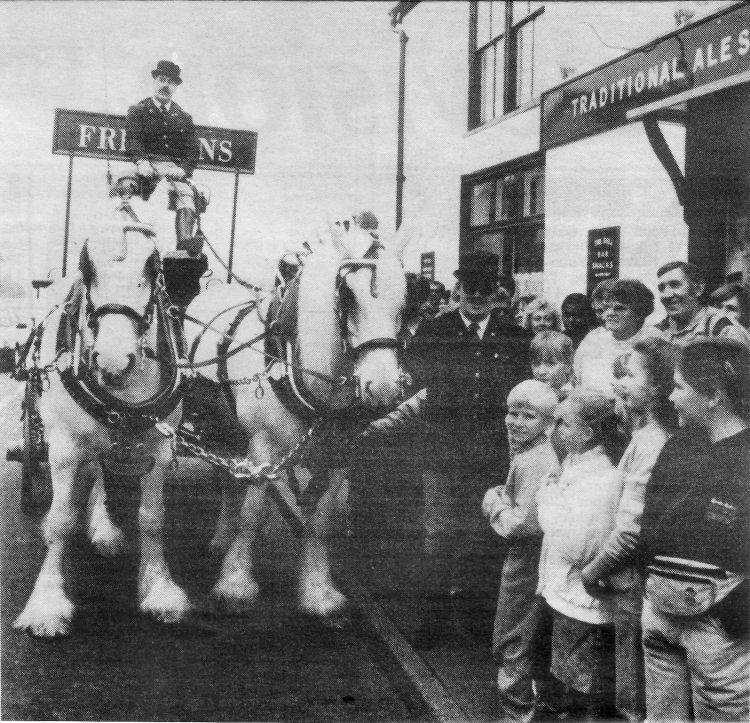
Crowds gathered to see a team of Whitbread Fremlin heavy horses who
paid a visit to the "Bull Inn" at Eastry on Saturday afternoon. The Shire
horses were at the pub to help landlord and lady Steve and Rose Smith
celebrate their first anniversary at the newly decorated Eastry pub.
|
|
From the East Kent Mercury, 30 November, 1989.
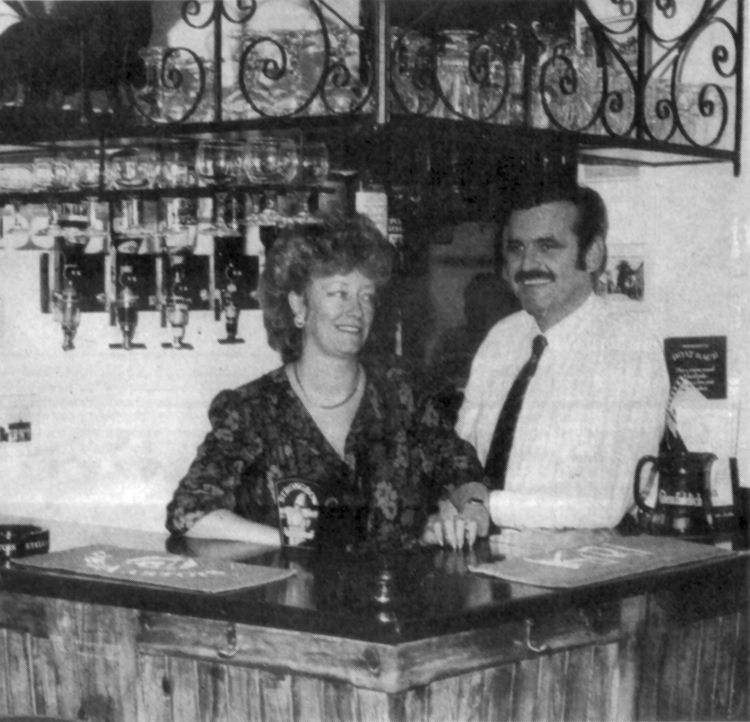
The "Bull Inn" at Eastry is one of East Kent's most
historic hostelries. It was certainly an Inn in the 1500s and has
been one ever since.
New licensee Steve Smith and his wife Rose plans numerous
improvements. Steve is already well known in Eastry. he was for 14 years
the owner of the local taxi business PJS Cars. Now he has taken over the
Whitbread house and plans to give it a new look, while retaining its
historic background.
COMFORT
Refurbishing is already under way and Steve and Rose have a programme
which includes new furniture, carpets and curtains. They are introducing
a new degree of comfort in keeping with the 1990s.
The "Bull" has a good sporting reputation and has enthusiastic pool
and darts teams. There is a spacious children's room. Steve is to
introduce bat and trap next year and there is bound to be a lot of
interest in this game, which is reputed to be a forerunner of cricket and
is very popular in the Canterbury area. The "Bull" has a large garden and
this will be brought into full use by Steve and Rose next year. There
will be barbeques and other functions when the long warm summer evenings
return.
Rose will be introducing a wide range of bar food in the near future.
her menu will include lasagne and scampi, together with a variety of
filling for baked potatoes. The food will be available at lunchtime and
in the evening.
The "Bull" is a big pub and its bars, even when busy, have plenty of
room. This goes back to the Victorian days when it was a popular coaching
in and travellers came to refresh themselves in Dickension manner.
FRIENDLIEST
Today it means there is room to stretch one legs in a chair, or to
stand at the bar without being jostled. There is room to drink and chat
in the friendliest way. The "Bull" stands in the centre of Eastry, on the
main road through the village. There is a free car park adjacent, which
means there is no problem with the car.
Steve and Rose offer customers a warm welcome at all times and are
looking forward to making many new friends.
On new Year's Eve they will host a fancy dress party which promises to
be plenty of fun and a marvellous way in which to greet 1990.
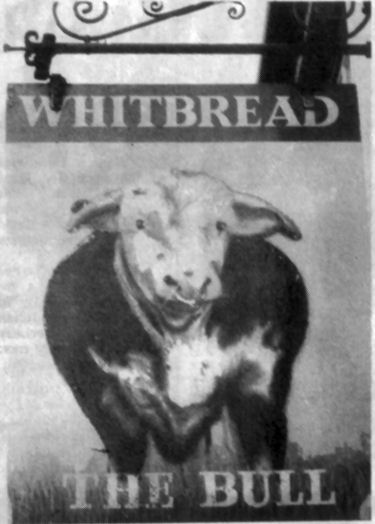
|
|
From the East Kent Mercury, 30 October, 2008.
DINNER'S ON ME, SAYS PUB MANAGER
There's no such thing as a free lunch.
But at the Bull Inn at Eastry, lessee Charlie Gibbons has started
giving away free dinners.
The concept, aimed to help his customers beat the credit crunch, was
dreamed up by Mr Gibbons when he noticed that afternoon and evening trade
was dying at the village pub because of the economic downturn.
He admits it was quite a drastic step to take, but the marketing ploy
where only 12 free meals are given away each day, has actually helped
trade at the same time as feeding people on a budget.
"2007 was our best year ever, but this year trade has been quiet since
Easter, but I realised I needed a new way to get customers in.
"Of course, the hope is that they will buy a drink, but if they don't
want to, they still get the food," he said.
The promotion has generated a lot of interest, and Mr Gibbons found
himself catering for a Meridian news crew who had heard of the offer on
Thursday.
|
|
From the Dover Express, Thursday 13 January 2011.
I'LL BRING PUB BACK TO TRADITIONAL WAYS
VOW OF NEW LANDLORD AS HE TAKES ON VILLAGE INN
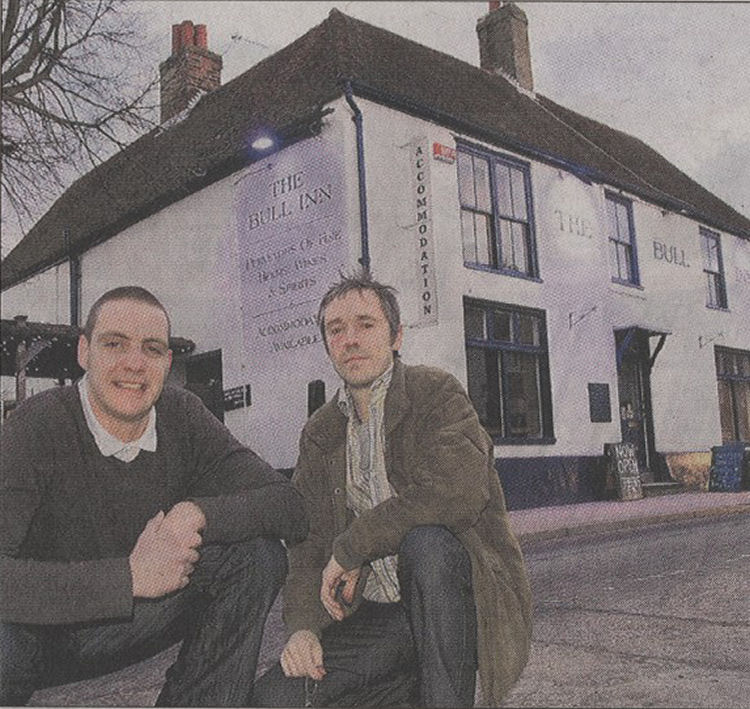
Traditional: New landlord of the "Bull" Paul McMullan, right, with
bar manager Karl Wooding.
THE "BULL" in Eastry has been taken over by a new owner, who plans to
return the historic boozer into a traditional village pub.
The 500 year old tavern on the High Street initially provided a resting
point for coaches, horses and travellers on their way from Canterbury to
the coast.
But from being one of the busiest and most profitable pubs in east Kent,
The "Bull" has declined like so many others.
New landlord Paul McMullan, who also owns The "Castle Inn" in Dover and
was featured in the Deal and Sandwlch Express last week when he picked
up actor Hugh Grant on the way to stock "The Bull," has been set the
task of organically growing the business back to the way it was.]
He said: "Everybody says the way forward for pubs is turning them into
flash restaurants, but "The Bull" is a prime example of just how wrong
that was.
HUB OF VILLAGE
"For years the people were happy to pop in for a pint and a chat and
the place was the hub of social life In the village. There was a pool
team, a soccer team and even a ladies darts team and business was really
thriving even in difficult economic times.
"However, a few years ago the pool table was replaced by a dining area
and a fancy menu which completely destroyed the place, not only the ambiance but the turnover
too.
"Without giving away the exact figures, beer consumption, which
is the
only thing the brewery really cares about, fell by a massive 50 per cent and the
future of the pub was really in
jeopardy."
Punch Taverns, Britain's biggest pub chain which still owns the
freehold,
confirmed they hired Mr McMullan because of his success at turning round
"The Castle Inn" by going back to basics.
South East Manager of Punch Stuart Brown said: "It is true there are
many pubs in Britain which are no longer viable as people's habits
change but "The Bull" was not one of them and we hope by going back to
basics we can organically grow the business
"Serving food in pubs can work but in this case where so many of the local
drinkers felt excluded it didn't and the pub went into decline.
BAR MANAGER
Mr McMullan has shifted his bar manager Kart Wooding at "The Castle lnn"
over to "The BulI" as he is originally from the village and is
affectionately known locally as "Pud."
Mr Wooding said: "I was born in Eastry and spent my teenage years in
"The
Bull" and it is fantastic to have the chance to bring it back to life. The
old landlord banned most of the regulars to turn it into a posh
restaurant and what a mistake that was. The first thing I am going to do
is throw all his tables and chairs away, bring back the pool table, Live
Sports TV and invite them all back again.
"In six months we get the Open Golf just down the road at Royal St
Georges, sandwich, and I have two five-star letting rooms where Sam
Torrance stayed the last time, so the future for "The Bull" for me is
looking really bright."
|
|
From the Dover Express, Thursday, 3 March, 2011. 60p
LANDLORD ROW
A Dover businessman has come under fire for rowdy drum and bass
nights at his Eastry pub and could now face the prospect of losing his
licence review.
Villagers are accusing landlord Paul McMullan, who also runs the "Castle
Inn," of creating antisocial behaviour.
Residents demand a review of inn's licence
Sound and fury over 'noisy' pub
Report by Yamurai Zendera
A DOVER businessman has come under fire for rowdy drum and bass nights
at his Eastry pub.
Landlord Paul McMullan could face the prospect of licence review
after a
group or villagers accused him of playing loud music throughout the night.
They say their lives have been made a misery for the past couple
of months by the antisocial behaviour of The "Bull's" punters.
Blaring
Loud music blaring through the night seven days a week, shouting and
swearing and vehicles revving their engines are just some of the reasons
the residents have cited as to why they are now demanding a licence
review.
Mr McMullan, who applied for a topless lap-dancing licence at his other
pub in Dover, the "Castle Inn," says he has
done nothing wrong.
He said: "If it was a rock night there wouldn't have been such
a furore. No underage people were let in and there were was no drug
taking."
The latest furore is a far cry from the promise the former tabloid
newspaper executive made when he first took over this year. Mr McMullan
said he wanted to turn the "Bull" into a traditional pub.
Residents say they have been unimpressed with the response to the police
and district council to their concerns and that talks with Mr McMullan have
proved fruitless.
A letter of complaint signed by the 13 residents has been sent to among
others - the police, the district council, MP Charlie Elphicke and Mr
McMullan himself.
It reads: "We feel that the activities of the "Bull" are completely
unacceptable in a residential, family environment.
"As you will be aware this is not the first time that residents have had problems
caused by the "Bull" and we do not want to see a replication of the
previous situation where fights, assaults and
criminal damage, caused by those drinking in the "Bull" were a regular
occurrence in the High Street.
"We feel that the authorities focus on the symptoms of the problem
and not the cause - the "Bull.""
LICENCE REVIEW
A Dover district Council (DDC) spokesman said it was considering
carrying out a licence review of the "Bull".
He said: "We are aware of this matter, and can confirm that an event
took place in Eastry that gave rise to complaints of noise nuisance and
alleged antisocial behaviour, which led to DDCOut of Hours Noise
officers attending the scene.
"This matter is currently being investigated jointly by Dover
district Council and Kent Police. The Licensing Section is liaising with
local residents with regards to a possible review of the premises
licence under the Licensing Act 2003."
Dover District Council says operators of licenses premises are
required to actively promote the four licensing objectives:
● Prevention of crime and disorder
● Prevention of public nuisance
● Public safety
● Protection of children from harm
Any interested party or responsible authority may call for the review
of a premises licence if they believe that the licensing objectives are
not being promoted.
This process is evidence-based and so it is important that the person
who is calling for a review has evidence to substantiate the
application.
The best way to do this is to keep diaries of the events that have
led the application including videos or photographs if they are
available.
|
|
From the Dover Express, Thursday, 10 March, 2011. 60p
MANAGER SET TO LEAVE TO 'SAFEGUARD FUTURE OF VILLAGE
PUB'
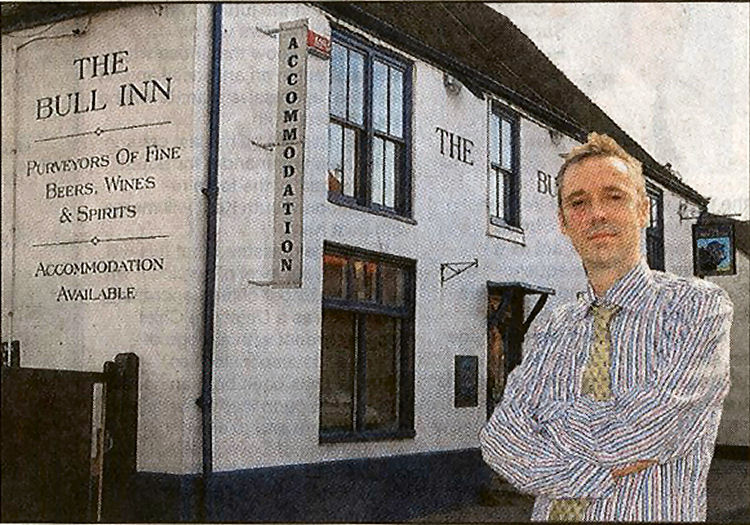
Row at music leads to
landlord's resignation
Report by Yamurai Zendera
A businessman has handed in his resignation as leaseholder of an Eastry
pub after coming under fire for holding rowdy drum and bass nights.
Landlord Paul McMullan says the "Bull" has no commercial value if it is
unable to hold regular music nights.
The pub is currently under investigation by Dover District Council (DDC)
and Kent Police and could be made the subject of a licence review after a
group of villagers accused Mr McMullan of blaring out drum and bass
throughout the night.
The father-of-four; who applied for a temporary topless lap dancing
licence al his other pub In Dover, the "Castle Inn," has now taken the
decision to walk away.
He said: "To safeguard the future of the pub in the village, I have
offered Punch Taverns my resignation as the tenant."
The former tabloid newspaper executive said his resignation was not an
admission of guilt, adding: "While there was no breach of the licence
and noise
restrictions were
adhered to.
"There were no underage people allowed in and we follow a vehement anti-drugs policy.
"I accept I was in full charge of that evening, so accept the
responsibility for the bad feeling in the village and on that basis
I'm happy to be the sacrificial lamb for the future of the pub."
It is still unknown if Punch Taverns has accepted his resignation but Ash
resident Mr McMullan, who bought the lease in December, said the pub was
costing him £1,000 a week.
He said: "The pub only makes money as a music venue. If I can't put on
music events then I don't want it. It's costing me £1,000 a week and I
must have entertainment to cover it."
The 13 villagers who made the initial complaint have refuted
they were only upset because of the genre of music being played.
A statement from a representative read: "l can assure Mr McMuIlan that the
furore would be exactly the same if a folk night resulted in the same
kind of trouble,
disturbance and noise nuisance.
"As I said in the letter this has not been an isolated incident and
residents are regularly disturbed by the noise levels, most recently this
weekend when two further complaints about noise nuisance
were made by residents on Saturday night.
A DDC spokesman said it is investigating a complaint in relation to a
music event that look place at the "Bull" on February 18.
He said: "We are aware of this matter, and can confirm that an event look
place in Eastry that gave rise to complaints of noise nuisance and
alleged antisocial behaviour, which led to DDC out-of-hours noise
officers attending the scene.
"This matter is currently being investigated jointly by Dover District
Council and Kent Police.
"The Licensing Section is liaising with local residents with regards to a
possible review of the premises' licence under the Licensing Act 2003."
|
Unfortunately closed after local residents became fed up with the
licensees like of Drum and Base which he held evenings for... And I can't
blame them either. That didn't sound like a traditional village pub to me
The licensee at the time being nude pole dancing organiser Paul McMullen,
also licensee of the "Castle" in Dover.
Latest news:- From Steve.
5 February 2012:- The boards have come down, however I understand the
interior needs an awful lot of cleaning up as it was left in a mess when it
closed. There was stale beer left in the pipes. It's going to take a while
to get sorted. The couple from the "Eagle"
will run it (allegedly rent free) as an addition to their own pub but I
think if I buyer comes along they will just hand over.
20 February 2012:- "It is likely that the Bull, Eastry will reopen in
approx two weeks. One of my staff is involved (with her husband) with
running the "Eagle" at Deal. She tells me that
they are additionally taking over the running of the "Bull" at Eastry. The
Bull has been closed since last April and needs a thorough clean up inside
which will take some time. The pub will need completely restocking. I've
banged on about making sure real ale is available, so hopefully the Bull
will return to the fold.
|
From the Dover Mercury, 16 August, 2012. 80p
From NOW AND THEN
TRIO OF PUBS IN THE VILLAGE ENJOYED A VARIETY OF PATRONS
Trio of pubs in the village enjoyed a variety of patrons
THE Bull Inn at Eastry, which has just been sold for £300,000, was
once the oldest pub in the village dating back to 1573, when it was a
coaching inn.
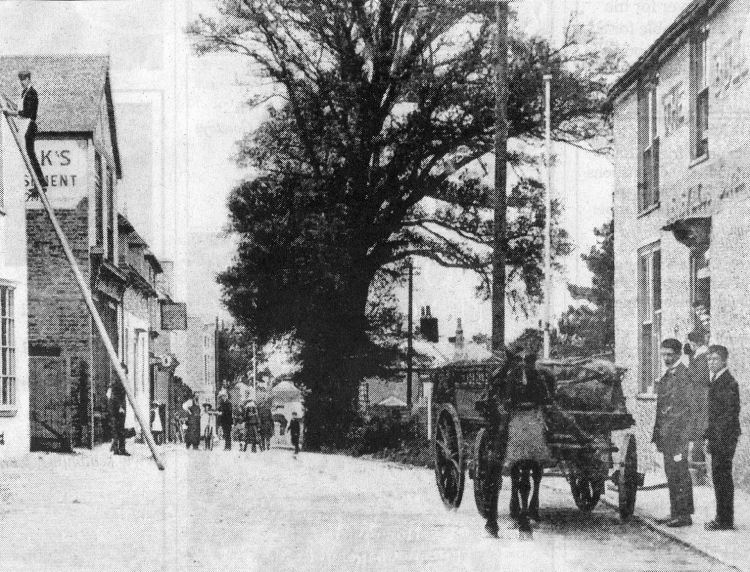
Above photo by Bob Barwick shows the "Bull" on the right.
At one time three pubs dominated the centre of the community and now
only The "Five Bells" remains in business with The "Plough" closed.
There was another public house in Lower Street called The "Coach and
Horses." According to Douglas Welby in his book The Kentish Village of
Eastry 1800-2000 the trio of pubs in the heart of Eastry served
different aspects of the village.
The "Plough" was considered to be a sometimes rowdy drinking house,
with loud singing much to the annoyance of the neighbours.
The "Five Bells" was known as a pub for the wealthy and influential.
The area also had The "Blazing Donkey" close by at Hay Hill, which is
Open 2014+.
Richard Russell was the licensed victualler of The "Bull Inn" from 1791
to 1805.
A series of male publicans were at the premises until 1847 when
Susannah Ferrier become licensed victualler for eight years.
The Dover Telegraph in May 1859 announced the sale of the building
and described The "Bull Inn" as “the well known Freehold Roadside Inn,
with commodious stabling, coach houses, large yard and premises
therewith, now in the occupation of Charles Lepine.” The newspaper
cutting continued: “Together with messuage, shop and premises adjoining,
occupied by the under tenant of Mr Lepine.”
In 1978 Linda and Bob Harris were at the pub, followed by Steve and
Rose Smith, then in 2002 Charles Gibbens.
The property recently closed as a public house and has just been sold
on behalf of Punch Taverns through Christie and Company to the Upstreet
Project, complete with seven bedrooms and a large garden. The Upstreet
Project intends to open a care home and already has two in Upstreet,
between Canterbury and Thanet, called Elizabeth House and Roberta House
which offers residential care for adults. See
www.dementia-care.com for more details.
|
|
From the Dover Express, Thursday, 4 October, 2012. 65p.
PUB SWITCH-UP
Plans are afoot to change The "Bull Inn" in Eastry High Street into a
residential care home.
The proposed change, which will require some conversion work, is part
of a planning application sent to Dover District Council in the name of
Mr and Mrs Tarry, for whom Herron Planning Consultancy of Ramsgate is
acting as agents.
|
|
From the East Kent Mercury, 15 November, 2012.
REFERENDUM BID OVER PUB CHANGE.
A public parish meeting will take place on Wednesday to call for a
referendum regarding the proposed change of use of Eastry's historic
"Bull Inn" in the High Street, into a residential care home, a move that
has strong local opposition. The meeting will take place at the parish
council meeting room at 7.30 pm.
|
|
From the Dover Mercury, 13 September, 2012. 80p. By Sue Briggs
PLAN OF CARE HOME IN OLD PUB GETS GO-AHEAD
A CARE home will soon be opening in a former pub in Eastry, despite a
big protest in the village against the move.
Three petitions and 127 letters were sent to Dover District Council, all
complaining about the change of use of the "Bull" in the High Street but
former Deal
Mayor Cllr Bill Gardner discredited the level of opposition in the
village.
He told Thursday's district council planning committee that many of the
letters were identical, “rather orchestrated” and there had been
scare-mongering.
Upstreet Project, which has two care homes for adults based in Upstreet,
between Canterbury and Thanet, had applied for permission to change the
pub into a residential care home and convert the interior of the listed
building.
It will be used to care for a maximum of 12 residents with Korsakoffs
syndrome, a brain disorder usually associated with heavy drinking.
In answer to criticism that the "Bull" should remain a pub, he said offers
to buy the property as one had not been high enough for the
sellers to accept.
He said: “There are very few planning grounds to turn down these plans
and objectors have been misinformed about the applicants and the
applications. This is a reasonable use of the building if it cannot be a
pub and the employment opportunities are good.”
Clive Alexander, the conservation officer at the district council, said
the changes to the listed building would be minimal and there will be no
loss of important historical fabric in order to carry out the changes.
He said: “It would be still be a heritage asset.”
The plans were approved, with no votes against.
Eastry Parish Council supported the plans and 18 letters were sent to
the district council in support of the proposals.
|
|
From www.Kentonline.co.uk 20
May 2014. By Emily Stott.
The Bull Inn, High Street, Eastry, is no
longer set to become a centre for alcoholics.
A former pub in Eastry is
no longer set to become a centre for recovering alcoholics.
The Bull Inn, High Street, Eastry, will be converted into housing
after a planning application to turn it into a care home for recovering
alcoholics faced strong opposition back in 2012.
The owners of the Grade II listed pub have now opted for a ‘less
contentious use to that of a single dwelling.
This means that plans to provide adult care for adults with
Korsakoff's Syndrome, a brain disorder associated with heavy alcohol
consumption, will not be going ahead.
The main pub building, built in the 1700s will be used as the main
dwelling while the rear yard and stables will be used for parking and
turning.
The garden area will remain and it will be used as domestic garden
space.
The Bull ceased trading in 2010 when the owners decided the market
value did not warrant the refurbishment it needed.
The application will be reviewed by Dover District Council before an
decision is made. |
I am informed (2019) that the premises has been converted into a
residential home.
LICENSEE LIST
HALL William 1693+ ☼
ADAMS Thomas 1702+ ☼
DURBAN Ingram 1725-40+ ☼
CULLER William 1763 ☼
CULLER (Widow) 1763+ ☼
SOLLEY John 1771+ ☼
RUSSELL Richard 1791-1805+ ☼
EASTES John 1806+ ☼
FERRIER John 1816-15/Feb/47 dec'd aged 66 ☼   
FERRIER Suzannah 1847-51+ (widow age 62 in 1851 ) )

LEPINE Charles 1855-58+ ☼
MANSER Edward 1860-82 ☼  (also Taylor age 48 in 1861
(also Taylor age 48 in 1861 ) )
BUSHELL John 1891-99+
  (jobmaster)
(jobmaster)
ELMS James William 1903+
 
WILLS JAMES 1906-Nov/07

WOOD Reuben John Nov/1907-Jan/14
  
BRENCHLEY Henry Jan/1914-Feb/21

DENNIS Albert Joseph Feb/1921-June/22

ALLEN W H or T H June/1922-Oct/25

DADDS/DOBBS F Thomas Oct/1925+

BROCKWELL Frederick 1930-Feb/1931+

POTTER Ernest Henry Feb/1931-Feb/32
 
GULLY Mr James Frederick Feb/1932 to May/1936
 
GODDEN A J E Mr May/1936-Oct/39

DYKE Mr G M Oct/1939-Jan/43

POOLE Mr Thompson Jan/1943-46+

FLEMING J 1961+
FLEMING Frederick 1974+
 Fremlins
Fremlins
 GRIGGS Horace N 1978+
GRIGGS Horace N 1978+
HARRIS Bob & Linda 1978+

SMITH Steve & Rose Nov/1979-80+
GIBBENS Charles 2002+

McMULLAN Paul 2011
TERRY Mr R Sept/2012 (Owner applied for change of use to residential care home.)
https://pubwiki.co.uk/BullInn.shtml
http://www.closedpubs.co.uk/bull.html
 From Wingham Division Ale Licences 1740 Ref: KAO - QRLV 3/1 From Wingham Division Ale Licences 1740 Ref: KAO - QRLV 3/1
 From the Pigot's Directory 1828-29 From the Pigot's Directory 1828-29
 From the Pigot's Directory 1832-33-34 From the Pigot's Directory 1832-33-34
 From the Pigot's Directory 1839 From the Pigot's Directory 1839
 From the Pigot's Directory 1840 From the Pigot's Directory 1840
 From
Bagshaw Directory 1847 From
Bagshaw Directory 1847
 From the Post Office Directory 1874 From the Post Office Directory 1874
 From the Post Office Directory 1882 From the Post Office Directory 1882
 From the Post Office Directory 1891 From the Post Office Directory 1891
 From
the Kelly's Directory 1899 From
the Kelly's Directory 1899
 From the Post Office Directory 1903 From the Post Office Directory 1903
 From the Kelly's Directory 1903 From the Kelly's Directory 1903
 From the Post Office Directory 1913 From the Post Office Directory 1913
 From the Post Office Directory 1914 From the Post Office Directory 1914
 From
the Kelly's Directory 1934 From
the Kelly's Directory 1934
 Library archives 1974 Library archives 1974
 From the Dover Express From the Dover Express
 From the Deal Walmer & Sandwich Mercury From the Deal Walmer & Sandwich Mercury
☼From Memorials of the Royal Ville and Parish of Eastry
1870
 From the Dover Mercury From the Dover Mercury
|














